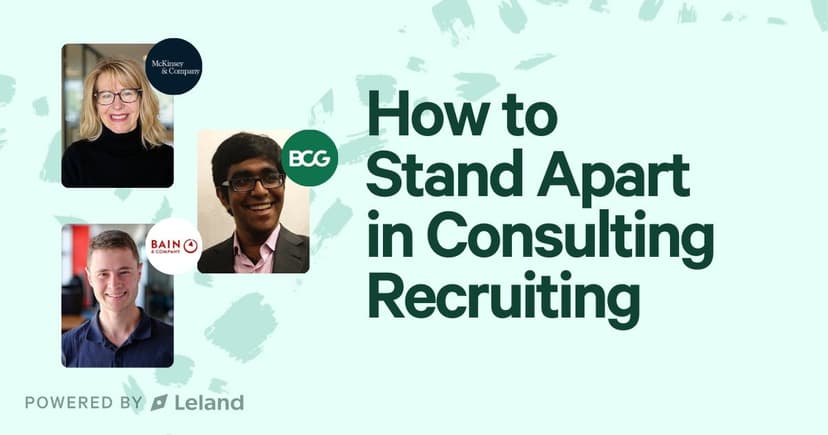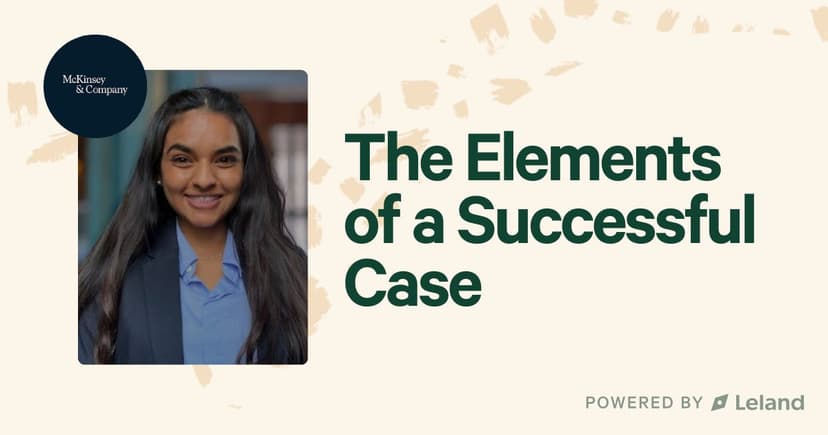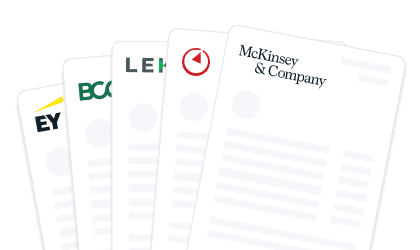Capital One Case Interview Guide: Questions, Examples, & Tips
Are you preparing for a Capital One tech case interview? Look no further! Our article provides essential tips and strategies to help you crack the interview and land your dream job.
Posted October 25, 2025

Join a free event
Learn from top coaches and industry experts in live, interactive sessions you can join for free.
Table of Contents
Case interviews are tough, and Capital One takes them to another level. If you’re applying for a role there, expect a fast-paced, math-heavy experience that tests not just your analytical skills, but also your structure, creativity, and resilience under pressure.
This -- you don’t have to figure it out alone. We will break down exactly how Capital One’s case interviews work, the types of questions you’ll face, and what top candidates do differently in this article. You’ll also get a proven prep plan, expert tips, and free resources to help you walk into the interview room (or Zoom call) feeling confident and ready to crush it.
What Is the Capital One Case Interview Like?
Capital One's case interviews aren’t your typical consulting cases. Think of them less like a McKinsey-style market sizing drill and more like a real-world business problem you'd be asked to solve on the job, with math, logic, and structured thinking all cranked up a notch.
You’ll be given a specific problem (like how to increase credit card adoption or optimize a customer service process) and asked to walk through it step-by-step. Interviewers want to see how you think, how you break down messy problems, and how comfortable you are doing quick, accurate math under pressure, often without a calculator.
They’re not looking for a perfect answer. They’re looking for clear structure, business intuition, solid mental math, and good communication. Capital One cases feel more collaborative, too. Expect your interviewer to ask follow-ups, challenge your assumptions, or nudge you toward deeper analysis as you go.
In short: it’s half strategy, half math, and all about showing how you approach real business decisions.
How Long Is the Case Interview?
The typical Capital One case interview lasts 30 to 45 minutes, sometimes slightly longer if there’s a deeper technical section or follow-up discussion.
Here’s how the time usually breaks down:
- First 5 minutes: Setting up the problem (listen carefully here -- many key details are dropped casually)
- Next 20-30 minutes: Solving the case, such as brainstorming, doing calculations, and structuring your answer
- Final 5-10 minutes: Wrap-up discussion -- summarizing your approach, reflecting on what you’d improve, or answering behavioral questions
One important tip: Pace yourself.
You don’t have to rush through every calculation immediately. Interviewers actually want you to pause, structure, and explain before diving into numbers. A calm, logical walkthrough always beats racing to an answer.
How Capital One Cases Differ From Consulting Firm Cases
If you’ve practiced consulting cases (like Bain, BCG, or McKinsey), you’re already ahead, but you’ll need to adjust your approach for Capital One.
Here’s where Capital One cases are different:
| Capital One Cases | Consulting Firm Cases |
|---|---|
| Heavy on mental math and quantitative reasoning | Heavier on structuring frameworks and qualitative insights |
| Expect specific numbers and calculations without a calculator | More focus on big-picture strategy and market dynamics |
| Interviewers guide you more actively (almost coaching during the case) | Interviewers often stay neutral and let you drive solo |
| Business questions are often more operational (cost reduction, process optimization, credit risk) | Questions lean toward market entry, profitability, or M&A strategy |
| You’re judged on your logical thinking + math accuracy | You’re judged more on issue trees, hypothesis-driven thinking |
Why this matters: Capital One cares deeply about how you'd perform on the job, so the case mirrors real-world decision-making. It’s less about putting on a polished performance and more about thinking practically, moving clearly through math and logic, and showing coachability when you get new information.
Capital One Case Interview Format and Structure
When you walk into a Capital One case interview, you should know exactly what’s coming, no surprises. Their cases are structured but practical. You’re solving a real-world business problem, often with numbers you need to crunch quickly and thoughtfully. Here's how the flow usually goes:
1. Prompt Setup (5 minutes):
The interviewer gives you a short business scenario, usually something related to customer acquisition, product pricing, operational efficiency, or credit risk.
2. Clarifying Questions (2–3 minutes):
You can (and should!) ask questions to make sure you understand the goal. Smart clarifying questions show that you’re strategic and not just rushing.
3. Structuring the Problem (5–10 minutes):
Lay out a simple, logical framework. It doesn’t have to be fancy; clear, practical steps matter more than "consulting buzzwords."
4. Math-Heavy Analysis (15–25 minutes):
You’ll be asked to work through numbers. Think customer volumes, revenue projections, and breakeven points. You’ll need to perform mental math accurately, explain your process out loud, and adjust based on new data the interviewer gives you.
5. Recommendation and Wrap-Up (5 minutes):
Summarize your findings clearly:
- What decision would you make? Why?
- What assumptions would you test next if you had more time?
Capital One interviewers aren't looking for the perfect answer. They're looking for strong structure, clear math, and the ability to adjust logically when new information hits.
Capital One vs Consulting Cases Comparison
If you’ve practiced consulting cases (Bain, BCG, McKinsey), you’ll recognize some parts of Capital One’s style, but there are important differences you need to prepare for.
Here’s a quick side-by-side comparison to make sure you’re not caught off-guard:
| Aspect | Capital One Cases | Consulting Firm Cases |
|---|---|---|
| Focus | Highly quantitative and operational | More strategic and market-driven |
| Mental Math | Constant - breakeven, revenue, risk calculations | Some mental math, but often lighter |
| Frameworks | Helpful but simple; clarity matters more than memorized models | MECE, issue trees, etc. |
| Interviewer Role | Interactive. They guide, push, and hint | Neutral. They watch you drive independently |
| Common Topics | Credit products, process optimization, customer segmentation, pricing decisions | Market entry, M&A, profitability, growth strategy |
| Use of Data | Data-heavy such as tables, charts, numerical assumptions | Some data, but often more qualitative reasoning |
| Pace | Fast-paced but conversational; practical over polished | Slower but more formal; heavy on hypothesis testing |
Sample Capital One Case Interview Questions (with Answers)
1. Credit Card Profitability Case
Question:
“Capital One is considering launching a new credit card targeting college students. How would you assess whether this product would be profitable?”
Sample Answer:
"To assess profitability, I would calculate the average annual revenue per customer, considering interest income and transaction fees, and subtract the average annual cost per customer, including acquisition, servicing, and default costs. For example, if the average annual revenue is $100 and the average annual cost is $80, the profit per customer would be $20. I would also perform sensitivity analysis to see how changes in default rates or average spend affect profitability."
2. Operational Efficiency Case
Question:
“Our call center has been experiencing increased wait times. How would you approach reducing these wait times without significantly increasing costs?”
Sample Answer:
"I would start by analyzing call volume patterns and identifying peak times. If we find that certain hours have higher volumes, we could adjust agent schedules to ensure more coverage during those times. Additionally, implementing or enhancing IVR systems could help route calls more efficiently, reducing handling time. Offering self-service options online for common inquiries could also divert some call volume, all of which can help reduce wait times without significant cost increases."
3. Product Strategy Case
Question:
“Capital One is considering introducing a new savings account product with a higher interest rate. How would you evaluate the potential success of this product?”
Sample Answer:
"To evaluate the potential success, I would first analyze market demand and competitor offerings to ensure our product is competitive. Then, I would segment our customer base to identify those most likely to be attracted to a high-interest savings account. Financially, I would model the impact of higher interest expenses against the expected increase in deposits. Finally, I would assess risks such as cannibalization of existing products and ensure compliance with regulations."
Pro Tip:
When tackling Capital One case interviews, focus on structuring your thoughts clearly, performing accurate calculations, and articulating your reasoning at each step. Interviewers value a logical approach and the ability to adapt to new information over simply arriving at the "right" answer.
Common Types of Capital One Case Studies
If you’re preparing for Capital One, one of the smartest moves you can make is understanding the specific types of cases they love to give. Capital One isn’t random. Their cases reflect real business challenges the company deals with every day. Here's what you should expect:
Profitability and Break-Even Cases
You might be asked to figure out if a new credit card product is profitable or when an investment (like new call center technology) will break even. These cases test your ability to structure costs and revenue clearly, and do mental math fast.
Customer Growth and Segmentation Cases
You could be asked to identify how to grow a product’s customer base or segment different customer types based on spending habits. Here, interviewers look for your ability to prioritize, not all customers are created equal.
Risk Management Scenarios
Capital One's roots are in credit, so expect cases around risk. Example: Should we lower the approval bar for a credit card? What’s the trade-off between growth and default risk?
Operational Efficiency Problems
These cases ask you to find ways to make internal processes faster, cheaper, or better — like improving call center wait times or optimizing an online application funnel. Think: process mapping + quick math on operational savings.
Product Strategy and Pricing
In some roles (especially product management), you might be given a case on launching or pricing a new product. Capital One wants to see if you think logically about customer needs, competition, and basic business trade-offs.
How to Prepare for the Capital One Case Interview
Preparation for Capital One isn't about memorizing flashy frameworks, it's about building muscle memory in four key areas.
1. Master Business Math: Be fast and clean with mental math. Practice percentages, breakevens, cost-benefit analysis, and unit economics without a calculator.
Example: If acquisition costs are $25 per customer and revenue per customer is $40, what's the payback period?
2. Practice Structuring Real-World Problems: You don’t need fancy consulting frameworks.
Instead, practice simple, logical structures for different business goals:
- Growing revenue
- Reducing costs
- Balancing risk and growth
- Improving customer experience
3. Get Comfortable Thinking Out Loud: Capital One interviewers reward candidates who explain their thought process clearly, not just those who get the “right” answer. Talk through your logic, state assumptions, and summarize as you go.
4. Build Stamina with Timed Practice: Set a timer for 30 minutes. Solve a mock case fully, including math steps and a recommendation.
Why? Because Capital One interviews move fast, and you need to be comfortable keeping pace without losing your structure.
If you're applying for Product Manager or Analyst roles, skim a few basic concepts on A/B testing, NPV calculations, or pricing strategy. They sometimes sneak into product-related cases.
Tips to Stand Out in Your Capital One Interview
This is where you separate yourself from the 90% of candidates who are “good enough” and land in the 10% who get offers. Here’s what truly moves the needle at Capital One:
1. Use Practical, Real-World Thinking: Don’t chase perfection. Capital One loves when candidates treat cases like real business problems -- "What would actually make sense if this were my job?"
2. Stay Calm During Math Pressure Moments: Everyone messes up small math steps at some point. What matters more is how you recover. Double-check your work, stay cool, and adjust your logic if needed.
Calmness under fire = huge bonus points.
3. Prioritize Ruthlessly: When they give you 5 possible strategies to grow a product, don’t try to analyze them all equally. Pick 1–2 high-impact options and go deeper. Capital One values prioritization because that's real-world business thinking.
4. Frame Your Recommendations Like a Decision Maker:
Don’t just say “the NPV is positive.” Say,
"Based on the financials and risk profile, I would recommend moving forward with the investment, starting with a pilot to validate customer uptake."
This shows ownership and practical judgment, two things Capital One prizes.
5. Show You're Coachable: If your interviewer nudges you with a hint, take it gracefully. Adjust your thinking, move forward confidently, and thank them. Coachability signals you're someone they want to work with and mentor.
Want expert feedback on your Capital One case interview skills? Get coached by someone who's been on the inside.
Bottom Line
Succeeding in the Capital One case interview is about being structured, sharp with your math, and calm under pressure. Capital One cases are different from traditional consulting cases: they’re more quantitative, more operational, and much closer to the kinds of real decisions you’d make on the job.
If you focus on mastering the business basics (mental math, logical structuring, clear communication) and treat each case like a real-world problem you’re solving for a manager or a team, you’ll already be ahead of most candidates.
Also, interviewers aren’t just looking for the “right answer.” They’re looking for someone they trust to make smart, practical decisions when the numbers aren't perfect and time is tight.
Practice smart, stay calm, and show them you’re ready to think like a Capital One problem-solver from day one. You've got this!
Launch Your Career with the Help of an Expert Management Consultant
Acing a case interview may take a lot of preparation and skill, but you don’t have to do it all alone. Working with an expert in management consulting who has been through this process can help you learn all you need to know to interview with the expertise and confidence that will land you the job you deserve.
Book an intro call with a management consulting coach to learn more about how their support and guidance can steer your career in the right direction.
Capital One Case Interview FAQs
How hard is a Capital One case interview?
- Capital One case interviews are challenging because they combine real-world business scenarios with fast-paced math and structured thinking. They're not as formulaic as consulting interviews, they expect you to apply strong business judgment and clear problem-solving skills under time pressure. With the right preparation, they're tough but very beatable.
What is an HM case interview with Capital One?
- An “HM” interview refers to the Hiring Manager case interview. It usually happens later in the Capital One interview process, often during the final stage or final round. The Hiring Manager case tends to be even more focused on real business decision-making and how you'd approach solving problems if you were already on the team.
What to expect in a case interview?
- Expect to get a real business scenario (like launching a new product or fixing an operational issue), ask clarifying questions, structure your approach, do quick math, and deliver a final recommendation. The interviewer will watch how you organize your thoughts, explain your steps, and adapt when new information comes in.
How do you pass a case interview?
- You pass by showing strong problem-solving skills, sharp math, clear structure, and calm thinking. Capital One interviewers are looking for how you tackle uncertainty, prioritize key factors, and communicate your logic.
How to prepare for a case interview with Capital One?
- Start by mastering mental math, practicing real sample case interview questions, and simulating timed case practice. Focus on breaking down business problems clearly and building habits around structured thinking. Also, review the online assessment you completed earlier, sometimes, similar thinking skills are tested live in the case.
Read More:

































